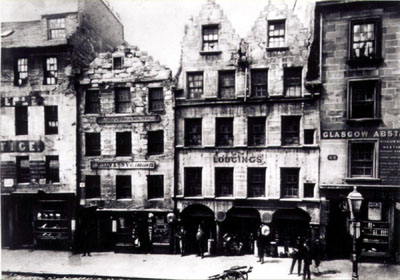
Old buildings in High Street, 1870s. The Public Health Act, 1867 introduced new rules and regulations for the keepers of common lodging houses such as those shown here, defined as "a house or part thereof where lodgers are housed at an amount not exceeding fourpence [just over 1.5p] per night for each person." The control of lodging houses was transferred from the police to the local authority.
There was a mission run by the Glasgow Abstainers' Union at 29 High Street (far right). The Union was formed in 1854 "for the promotion of temperance by the combined agencies of education, recreation, and restoration" and represented around forty Glasgow societies. It attempted to provide alternative entertainments "as a counter-attraction to the pernicious influence of the public house." The premises were used on Saturday evenings to provide concerts and on Sunday evenings for lectures and meetings about the evils of drink.
Reference: Heatherbank Museum of Social Work, print 6184a
Reproduced with the permission of Glasgow Caledonian University, Heatherbank Museum of Social Work
Keywords:
common lodging houses, concerts, crow-stepped gables, Glasgow Abstainers' Union, hostels, lodgers, McIlvenny's Lodgings, missions, overcrowding, Public Health Act 1867, single men, slum housing, slums, streetscenes, teetotalism, temperance
You have 0 images in your photo album.